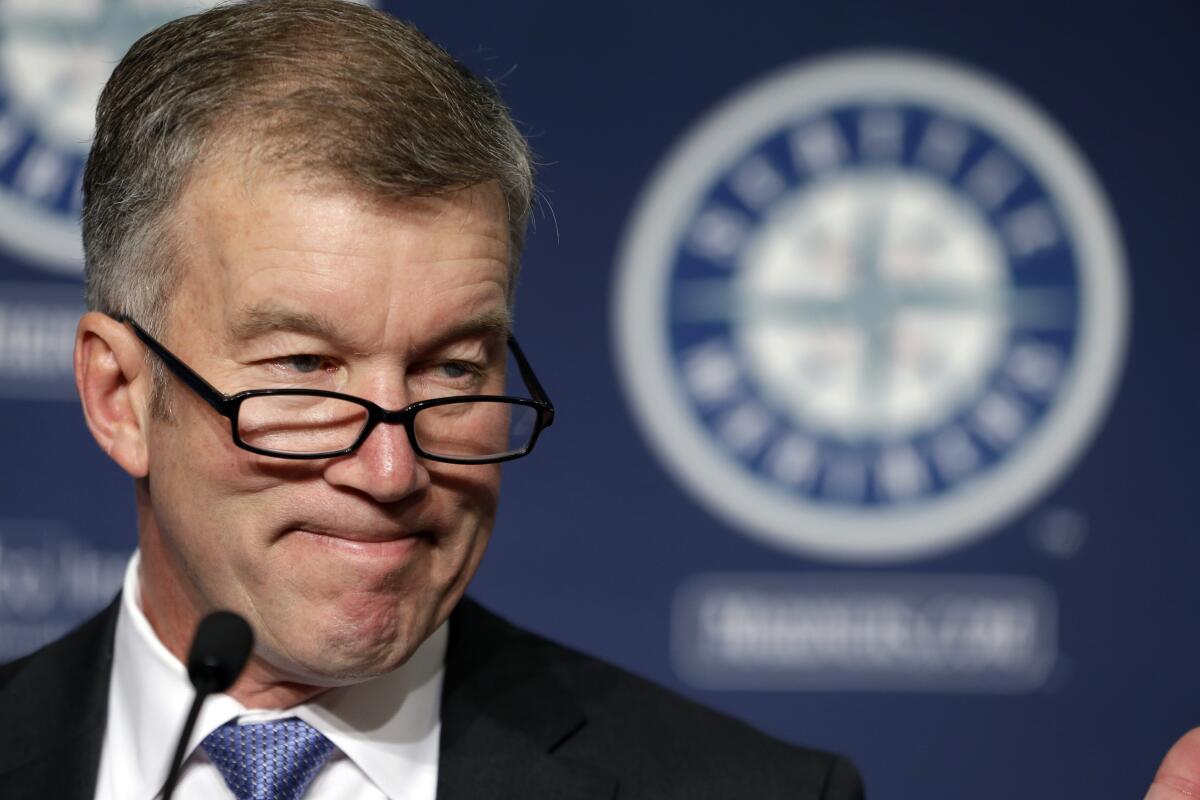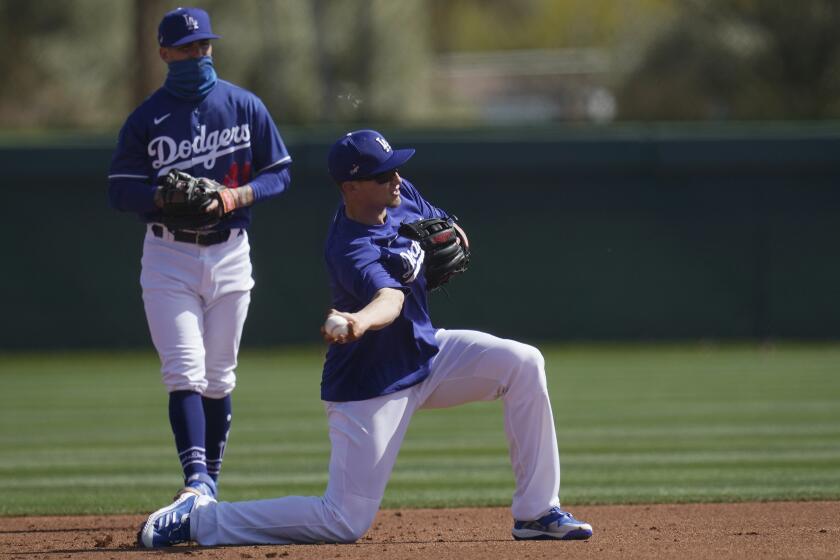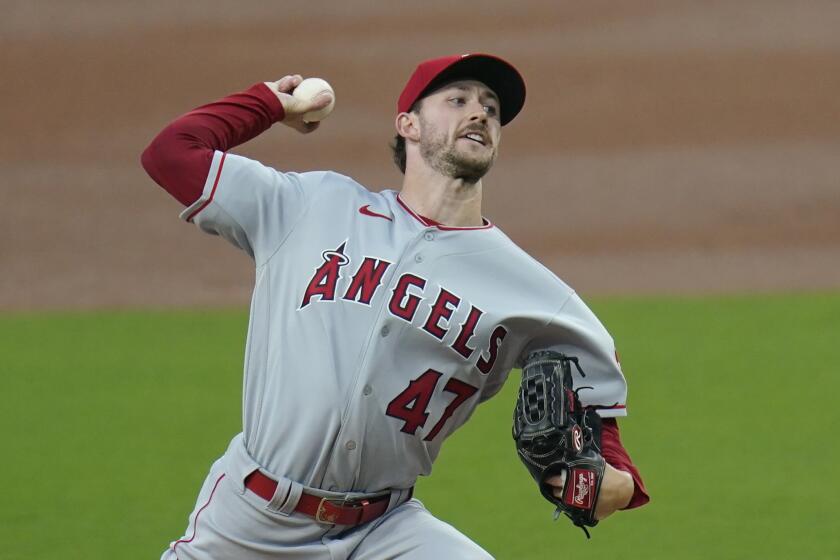MLB truth, lies and videotape: A telling week for a budding star and a team president

- Share via
This week in baseball: There were two huge stories, and in a moment we’ll get to the celebration of Fernando Tatís Jr., who signed the longest contract in major league history. The other huge story involved the Seattle Mariners, whose president shot himself in the foot so many times in one Rotary Club speech that he ran out of bullets.
The video of the speech went viral. The president, Kevin Mather, lost his job the next day.
That the commissioner’s office and the players’ union distrust one another is no great insight. By now, it’s almost a cliché. But seldom do we see evidence of this dysfunction as clearly as we did in the aftermath of Mather’s speech.
The collective bargaining agreement expires in December. In the absence of a new deal, the 2022 season is in jeopardy, either by lockout or strike. The parties could work to resolve the issues, but the dueling reactions to Mather’s speech make painfully clear the two sides cannot even agree on the issues. The official statements read as if the two sides watched different videos.
The statement from the league: “We condemn Kevin Mather’s offensive and disrespectful comments about several players. We are proud of the international players who have made baseball better through their outstanding examples of courage and determination, and our global game is far better because of their contributions. His misguided remarks do not represent the values of our game and have no place on our sport.”
Dodgers shortstop Corey Seager is coming off a sensational season and will be a free agent at the end of 2021. But he doesn’t want to talk about a new contract.
Translation: We’re working hard to grow our sport around the world, Kevin, and we’re fighting to persuade talented athletes in the United States to play it. You just whined about having to pay for a translator, in the same speech in which you complained that a Dominican player did not speak English well enough for you. You also said one of your key players would go into the Mariners Hall of Fame and yet, a few minutes later, you announced he was overpaid.
The statement from the union: “The club’s video presentation is a highly disturbing yet critically important window into how players are genuinely viewed by management. Not just because of what was said, but also because it represents an unfiltered look into club thinking. It is offensive, and it is not surprising that fans and others around the game are offended as well. Players remain committed to confronting these issues at the bargaining table and elsewhere.”
Translation: Thanks, Kevin. You just confirmed what the league keeps telling us isn’t true. Yes, the owners flood the free agent market, driving down prices for veteran free agents until they, as you put it, “come with hat in hand, looking for a contract.’”And, yes, the owners manipulate service time; you declared you had two prospects that would not be ready for opening day but would magically be ready a few weeks into the season.”
To the league, Mather came off sounding like a jerk. He had to go, even if his departure was announced as a resignation, before fans started wondering whether the man that runs their favorite team would have come off sounding like a jerk if he had forgotten he was speaking on video.
To the union, Mather validated a concern that persists even with him gone. Seattle has not appeared in the playoffs since 2001, and the team president was boasting about keeping two top prospects off the opening day roster in 2021 so the Mariners could keep their contracts under team control through 2027, instead of 2026.

Jerry Dipoto, the Mariners’ general manager, met with the players to assure them that what Mather said did not reflect how the team truly valued its players. But Mather had been the president of the team, so the players reacted awkwardly.
“It was literally like someone farted in church,” outfielder Jarred Kelenic told USA Today. “That is the exact expression on everybody’s face.”
Kelenic was one of the prospects Mather said would not be included on the opening day roster.
“I’m not sure how you construe a service-time manipulation with a 21-year-old player who has played just over 20 games above A-ball and has not yet achieved 800 plate appearances as a professional player,” Dipoto told reporters.
The 1995 Mariners saved baseball in Seattle, spotting the Angels a 13-game lead in the American League West, then roared back to win the first division title in franchise history — spurring the construction of a beautiful outdoor ballpark to replace the dreary Kingdome, and sparking a glorious decade in which attendance soared from 1.6 million to 3.5 million.
The Mariners’ roster in 1995 included Alex Rodriguez, 19, and Ken Griffey Jr., who had made his major league debut at 19, with 17 games above A-ball and 555 minor league plate appearances.
In 2019, the San Diego Padres included shortstop Fernando Tatis Jr. on their opening day roster, at 20. In 2020, the Padres earned their first playoff berth in 14 years.
The Padres capped baseball’s most exciting winter this week, officially signing Tatis through 2035. A lesser team might have manipulated his service time and told its fans it wanted to control an extra year lest he leave for a bigger market in free agency. The small-market Padres put the lie to that oft-cited rationale. Play him when he’s ready, and pay him when he performs.
Angels starter Griffin Canning, limited by injuries in 2019 and the shortened schedule last year, has lofty goals for his third major league campaign.
Now Tatis can get on with becoming the face of baseball, or at least trying to be. The Padres last sold 3 million tickets in 2004, the debut season of Petco Park. They ought to sell another 3 million come 2022.
Google “best football movies of the 21st century,” and the first image is of a football player. Google “best baseball movies of the 21st century,” and the first image is of a general manager.
The legacy of “Moneyball,” two decades later: The Padres sign Tatis for a third of a billion dollars, and a generation of armchair general managers frets about the team’s financial flexibility. The Kansas City Chiefs sign Patrick Mahomes for half a billion dollars, and the debate is about how many Super Bowls he might win.
That Mather basically admitted to manipulating service time solves nothing for the players. The Chicago Cubs kept infielder Kris Bryant in the minors long enough to get an extra season of control, and Bryant lost his grievance because teams have the right to decide when players are ready for the majors. Kelenic might win a grievance because Mather essentially admitted skill was not the deciding factor, but most executives would not be foolish enough to say so publicly.
The union has complained about service time manipulation for years, and the league has complained that the union has failed to present formal proposals to remedy the situation. That will happen in the upcoming rounds of bargaining, and a solution might not be as impossible as it seems: In 1990, after eligibility for salary arbitration had risen from two to three years of service, the union won a partial rollback, and the top 17% of players with two years of service became eligible as well.
In this case, baseball could borrow from the NHL, in which free agency can be determined by service time or by age.
In the meantime, the union appears to be coalescing around a talking point that is simpler to sell than service time manipulation: Fans are cheated when every team does not play to win.

“How, as a fanbase, can you accept that?” Dodgers star Clayton Kershaw told The Times’ Jorge Castillo. “The whole rebuild, don’t spend money for a few years, get a bunch of draft picks and try to do it, it’s tired. Every team does it now. Every team. They need to be more creative.”
There, too, remedies are not difficult to imagine: Tie draft picks and revenue sharing to winning games. Success on the field might not be the only factor, but it ought to count as one.
Of course, there is no solving a problem unless both sides agree there is a problem. If the Pittsburgh Pirates have won one postseason series in 28 years, and if they’re paying their entire team this season about as much as what the Dodgers are paying Trevor Bauer, is that a problem?
The Kansas City Royals play in a smaller media market than the Pirates do. The Royals might not have signed Bauer, George Springer or J.T. Realmuto this winter, but they did acquire pitcher Mike Minor, first baseman Carlos Santana and outfielders Andrew Benintendi and Michael Taylor.
“We don’t know any other way,” Royals general manager Dayton Moore said. “I think you’re trying to inspire people to follow your team. You’re trying to inspire young people to be a part of this game and want to play this game. What we’ve always tried to do is to be as competitive as we possibly can.
StubHub has listed 20 Dodgers tickets for the April 9 home opener against the Washington Nationals on sale at prices ranging from $1,450 to $9,000.
“Everybody will tell you that, whatever our budget is financially, we’ve taken it right to the max, every single year. We’ve spent whatever has been given to us. That’s on record.
“I think it’s really important to try and win each and every year.”
Under Moore, the Royals have had losing seasons more often than winning seasons. But they also have reached the World Series twice, and a generation of fans in Kansas City has a world championship team to call its own.
“I think, to be a great steward of the game, and to continue to grow the game in ways we think are the most healthy, you’ve got to bust your tail for the good of the players, the fans, the coaching staff, ownership and everybody surrounding the game,” he said.
“Put the best team you can on the field, period. That’s what it’s all about.”
More to Read
Go beyond the scoreboard
Get the latest on L.A.'s teams in the daily Sports Report newsletter.
You may occasionally receive promotional content from the Los Angeles Times.














